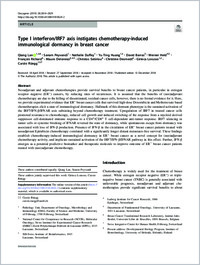Type I interferon/IRF7 axis instigates chemotherapy-induced immunological dormancy in breast cancer
- Lan, Qiang Pathology Unit, Department of Oncology, Microbiology and, Immunology (OMI), Faculty of Science and Medicine, University of Fribourg, Switzerland - National Center for Competence in Research (NCCR), Molecular Oncology, Swiss Institute for Experimental Cancer Research, (ISREC)-Ecole Polytechnique Fédérale de Lausanne, Switzerland - Developmental Biology Program, Institute of Biotechnology, University of Helsinki, Finland
- Peyvandi, Sanam Pathology Unit, Department of Oncology, Microbiology and, Immunology (OMI), Faculty of Science and Medicine, University of Fribourg, Switzerland
- Duffey, Nathalie Pathology Unit, Department of Oncology, Microbiology and, Immunology (OMI), Faculty of Science and Medicine, University of Fribourg, Switzerland
- Huang, Yu-Ting Pathology Unit, Department of Oncology, Microbiology and, Immunology (OMI), Faculty of Science and Medicine, University of Fribourg, Switzerland - National Center for Competence in Research (NCCR), Molecular Oncology, Swiss Institute for Experimental Cancer Research, (ISREC)-Ecole Polytechnique Fédérale de Lausanne, Switzerland
- Barras, David SIB-Swiss Institute of Bioinformatics, Lausanne, Switzerland
- Held, Werner Ludwig Institute for Cancer Research, Epalinges, Switzerland - Department of Fundamental Oncology, University of Lausanne, Switzerland
- Richard, François Breast Cancer Translational Research Laboratory, Institut Jules Bordet, Université Libre de Bruxelles, Belgium
- Delorenzi, Mauro SIB-Swiss Institute of Bioinformatics, Lausanne, Switzerland - Ludwig Institute for Cancer Research, Epalinges, Switzerland - Department of Fundamental Oncology, University of Lausanne, Switzerland
- Sotiriou, Christos Breast Cancer Translational Research Laboratory, Institut Jules Bordet, Université Libre de Bruxelles, Belgium
- Desmedt, Christine Breast Cancer Translational Research Laboratory, Institut Jules Bordet, Université Libre de Bruxelles, Belgium
- Lorusso, Girieca Pathology Unit, Department of Oncology, Microbiology and, Immunology (OMI), Faculty of Science and Medicine, University of Fribourg, Switzerland - National Center for Competence in Research (NCCR), Molecular Oncology, Swiss Institute for Experimental Cancer Research, (ISREC)-Ecole Polytechnique Fédérale de Lausanne, Switzerland
- Rüegg, Curzio Pathology Unit, Department of Oncology, Microbiology and, Immunology (OMI), Faculty of Science and Medicine, University of Fribourg, Switzerland - National Center for Competence in Research (NCCR), Molecular Oncology, Swiss Institute for Experimental Cancer Research, (ISREC)-Ecole Polytechnique Fédérale de Lausanne, Switzerland - Swiss Integrative Center for Human Health, Fribourg, Switzerland
-
2019
Published in:
- Oncogene. - 2019, vol. 38, no. 15, p. 2814–2829
English
Neoadjuvant and adjuvant chemotherapies provide survival benefits to breast cancer patients, in particular in estrogen receptor negative (ER−) cancers, by reducing rates of recurrences. It is assumed that the benefits of (neo)adjuvant chemotherapy are due to the killing of disseminated, residual cancer cells, however, there is no formal evidence for it. Here, we provide experimental evidence that ER− breast cancer cells that survived high-dose Doxorubicin and Methotrexate based chemotherapies elicit a state of immunological dormancy. Hallmark of this dormant phenotype is the sustained activation of the IRF7/IFN-β/IFNAR axis subsisting beyond chemotherapy treatment. Upregulation of IRF7 in treated cancer cells promoted resistance to chemotherapy, reduced cell growth and induced switching of the response from a myeloid derived suppressor cell-dominated immune response to a CD4+/CD8+ T cell-dependent anti- tumor response. IRF7 silencing in tumor cells or systemic blocking of IFNAR reversed the state of dormancy, while spontaneous escape from dormancy was associated with loss of IFN-β production. Presence of IFN-β in the circulation of ER− breast cancer patients treated with neoadjuvant Epirubicin chemotherapy correlated with a significantly longer distant metastasis-free survival. These findings establish chemotherapy-induced immunological dormancy in ER− breast cancer as a novel concept for (neo)adjuvant chemotherapy activity, and implicate sustained activation of the IRF7/IFN-β/IFNAR pathway in this effect. Further, IFN-β emerges as a potential predictive biomarker and therapeutic molecule to improve outcome of ER− breast cancer patients treated with (neo)adjuvant chemotherapy.
- Faculty
- Faculté des sciences et de médecine
- Department
- Médecine 3ème année
- Language
-
- English
- Classification
- Biological sciences
- License
-
License undefined
- Identifiers
-
- RERO DOC 324696
- DOI 10.1038/s41388-018-0624-2
- Persistent URL
- https://folia.unifr.ch/unifr/documents/307778
Statistics
Document views: 159
File downloads:
- pdf: 194
